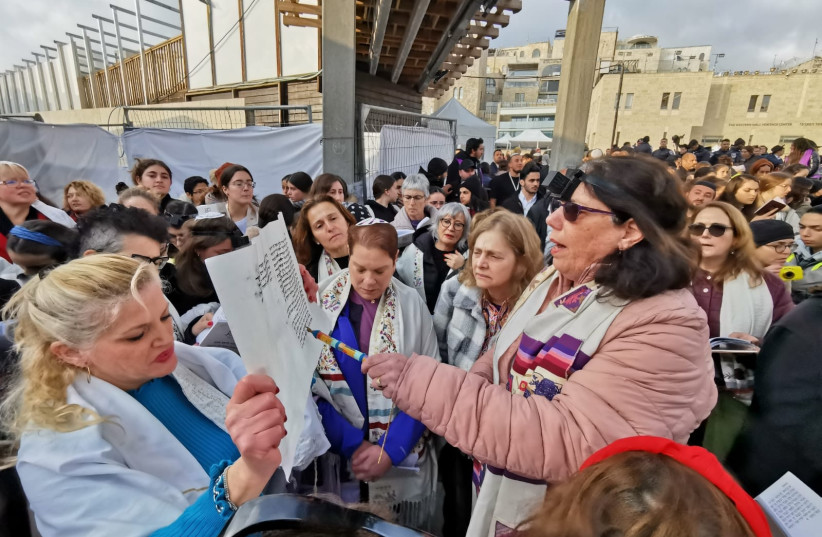Court demands answers on chief rabbi’s hate speech against LGBTQ, Reform Jews
The Supreme Court ordered the government on Tuesday to explain why it has not taken disciplinary action against Jerusalem Sephardi Chief Rabbi Shlomo Amar for comments he made against Reform Jews, the LGBTQ community, and the Women of the Wall movement.
The court order came after the Reform Movement, Women of the Wall, and the Jerusalem Open House for Pride and Tolerance filed a lawsuit concerning Amar’s comments.
Earlier this year, Amar blamed a series of small earthquakes in Israel on the LGBTQ community. In 2016, Amar called gay men “a cult of abomination” and said that homosexuality is “a wild lust that needs to be overcome.”
Amar has also called Reform Jews “evil people who do every injustice in the world against the Torah” and described the Women of the Wall as “the Satan that confuses people.”
“Do they care about prayer? Do they care about the Torah? Do they care about the Western Wall and the Temple? All they care about is uprooting the Torah, trampling and running over the dignity of the Torah,” said Amar about the Women of the Wall.

The petitioners noted that the Reform Movement has appealed to justice ministers and the attorney-general 16 times in the past four and a half years to address Amar’s statements.
Nili Mederer, the executive director of the Jerusalem Open House, stated “We must not turn a blind eye to such serious inciting statements. Not only is the chief rabbi of the city of Jerusalem abuses his office as he continues time and time again to incite against and humiliate the LGBTQ community, the members of the Reform communities and the Women of the Wall, instead of sending a message of tolerance, inclusion, and coexistence.”
“If the government does not protect its citizens, does not set a limit to freedom of expression, and allows the rabbi of the city to mock and utter words of contempt and hatred towards groups in Israeli society, it is also abusing its office. We will stand as a fortified wall for our community.”
Uri Narov, director of the Legal Department at the Reform Center for Religion and State, stated that “the Supreme Court recognized the severity of Amar’s inciting, humiliating, and offensive statements, which repeatedly attack Reform Jews, the LGBTQ community and the Women of the Wall. By issuing the order, the court sent a clear message to the religious services minister that his ignoring of this serious conduct and his refusal to take disciplinary measures against Amar is unacceptable.”
Yochi Rappaport, director general of the Women of the Wall, welcomed the court’s decision, saying “We experience the inciting results of the words of Amar and others like him every month at the Western Wall, when thousands of people, listening to him and other inciting rabbis, come to interrupt our prayers. A person like Amar, who uses inflammatory and inciting language towards entire communities, has no place in the state service and the state has the duty to act accordingly.”
Chief rabbis reject court order
Ashkenazi Chief of Israel Rabbi David Lau expressed support for Amar and rejected the court’s decision, calling it “sad and disappointing.”
“It is important to understand that every rabbi has the right and duty to express his position subject to the Halacha, the attempts to threaten through spiteful petitions will not loosen the hands of the rabbis of Israel. Any attempt to interfere with the halachic judgment of the rabbis of Israel in any halachic matter will not succeed.”
Sephardi Chief of Israel Rabbi Yitzhak Yosef called on the court to reverse its decision, calling the order “unacceptable.”
“Amar’s statements are by virtue of his position as a rabbi and his duty was to express his opinion without fear. I call on the Supreme Court to withdraw this ruling and allow freedom of speech for rabbis in order to fulfill their duties”
Religious Services Minister Michael Malkieli rejected the court’s decision, calling on the court to withdraw the order and give full freedom of speech to rabbis.
“It is forbidden to limit the work of rabbis, especially when it concerns the area of their authority and responsibility, and it was his duty to express his opinion without fear. This is the role of a rabbi in Israel,” said Malkieli.





Comments are closed.